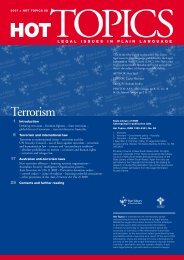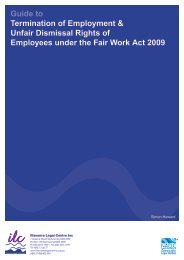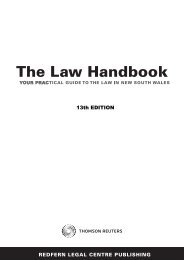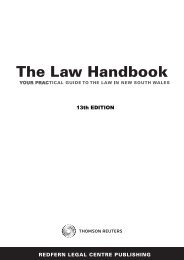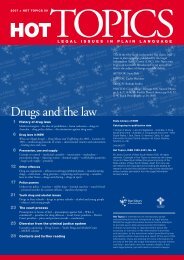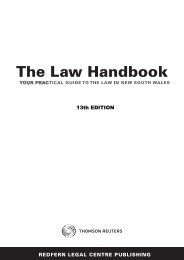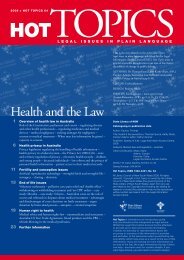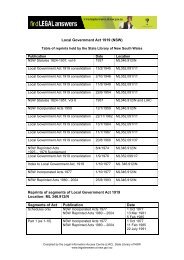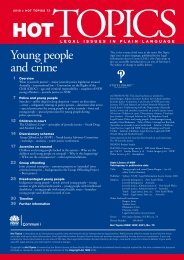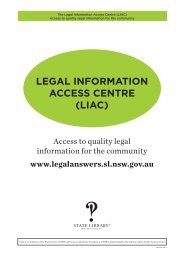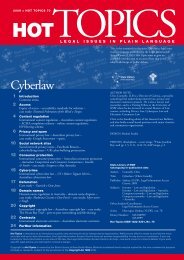Hot Topics - Issue 65: Human Rights - Legal Information Access ...
Hot Topics - Issue 65: Human Rights - Legal Information Access ...
Hot Topics - Issue 65: Human Rights - Legal Information Access ...
You also want an ePaper? Increase the reach of your titles
YUMPU automatically turns print PDFs into web optimized ePapers that Google loves.
At the Federal level, the Attorney-General said in May<br />
2008, in relation to law making and policy development<br />
at the Commonwealth level, that he would work with<br />
his Ministerial colleagues to ensure that human rights<br />
consultation takes place ‘at the policy development stage,<br />
and that it not be just a formality or an afterthought.’<br />
He also stated that it is ‘important’ to ensure that<br />
the drafting of Commonwealth legislation ‘consistently<br />
takes account of implications for [Australia’s] human<br />
rights obligations.’ 23<br />
HuMan riGHTs in sTaTe law<br />
All Australian states and territories have enacted<br />
anti-discrimination legislation. Under the Australian<br />
Constitution they can do so, as long as the state laws are<br />
not inconsistent with federal laws. Often the state laws<br />
go further in the protection they offer because states are<br />
not limited in their powers, as the Federal Government<br />
is, by the terms of international treaties. Some state<br />
laws, for example, protect against discrimination on the<br />
ground of religion or sexuality, grounds not covered by<br />
federal laws.<br />
state and territory human rights protections<br />
The Australian Capital Territory (ACT) was the first<br />
Australian jurisdiction to pass a version of a bill of<br />
rights, the <strong>Human</strong> <strong>Rights</strong> Act 2004 (ACT). In 2006,<br />
Victoria followed suit and passed the Charter of <strong>Human</strong><br />
<strong>Rights</strong> & Responsibilities Act 2006 (Vic). These laws are<br />
not ‘supreme’ laws like a constitution would be – they<br />
are simple Acts of Parliament that can be easily changed<br />
or overridden by a clear Parliamentary intention in a<br />
later Act.<br />
Neither the ACT <strong>Human</strong> <strong>Rights</strong> Act nor the Victorian<br />
Charter cover the field of human rights standards to<br />
which Australia has subscribed. Both Acts cover a<br />
selective range of rights, predominantly taken from the<br />
ICCPR. Both Acts recognise their selectivity and do<br />
not claim to be an exhaustive statement of individuals’<br />
human rights.<br />
These Acts are modelled on the United Kingdom<br />
<strong>Human</strong> <strong>Rights</strong> Act 1998 (UK). They are described<br />
as creating a ‘dialogue’ on human rights standards<br />
between the Executive, Parliament, the Judiciary and<br />
the community. They are also described as ‘preventative’<br />
models as they aim to put human rights at the forefront<br />
of governmental decision-making. The main features of<br />
the Victorian and the ACT Acts are that they:<br />
> create a process by which all new legislation must be<br />
scrutinised for its human rights implications, and be<br />
accompanied by a statement of compatibility with<br />
human rights before it is passed by the Parliament.<br />
Parliament has the power to legislate in a way that<br />
is contrary to the protected human rights, but this<br />
will be explicit at the time it passes such law and<br />
any limitation or override of human rights will be<br />
justified;<br />
> create a new rule of statutory interpretation to require<br />
courts and administrative decision makers to interpret<br />
existing and future legislation consistent with human<br />
rights, ‘so far as it is possible to do so consistently<br />
with [the law’s] purpose’. International law, and the<br />
judgments of foreign and international courts and<br />
tribunals may be used in interpreting the recognised<br />
human rights. If it is not possible to interpret the law<br />
in question consistently with human rights, courts<br />
can issue a declaration of incompatibility (ACT) or<br />
declaration of inconsistent interpretation (Victoria)<br />
that places the law back before the Executive and<br />
Parliament to decide whether or not to amend the law<br />
in question. The government of the day must respond<br />
within six months, in writing, and table the response<br />
in Parliament. The court’s declaration does not make<br />
the law invalid;<br />
> create a duty incumbent on ‘public authorities’ to act<br />
consistently with human rights, unless the law clearly<br />
authorises decisions or conduct that is inconsistent with<br />
human rights. A ‘public authority’ is any organisation<br />
(including its staff) that provides services of a public<br />
nature – for example, a private company that runs<br />
a prison on behalf of government. Both the ACT<br />
(from January 2009) and the Victorian Acts allow<br />
individuals to approach a court for a remedy (other<br />
than financial compensation) in relation to a violation<br />
of a protected human rights by a ‘public authority’;<br />
> establish periodic reviews to consider expanding the<br />
scope of protected human rights to include economic,<br />
social and cultural rights;<br />
> attempt to engender a human rights culture by measures<br />
such as appointing human rights commissioners<br />
responsible for reporting on the use of the relevant Act,<br />
monitoring compliance, educating the public service<br />
and the public at large, and promoting awareness of<br />
human rights. In the ACT, there is a <strong>Human</strong> <strong>Rights</strong><br />
Commission 24 and in Victoria, the Equal Opportunity<br />
Commission has become the Equal Opportunity and<br />
<strong>Human</strong> <strong>Rights</strong> Commission 25 .<br />
23. Commonwealth Attorney-General, The Honourable Robert McClelland MP, Address at the Australia and International <strong>Human</strong> <strong>Rights</strong><br />
Seminar: Coming in From the Cold, <strong>Human</strong> <strong>Rights</strong> & Equal Opportunity Commission, 23 May 2008, paras 40–42, available at http://www.<br />
humanrights.gov.au/legal/seminars/speeches/robert_mcclelland_may08.html.<br />
24. See www.hrc.act.gov.au<br />
25. See www.humanrightscommission.vic.gov.au<br />
the operation of international human rights law in australia 25



